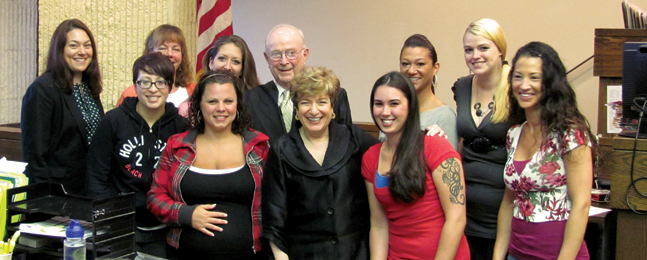Throwing the Book at Offenders

Courtesy Jean Trounstine
READING CIRCLE: Jean Trounstine (center) with Changing Lives Through Literature participants at their graduation ceremony, held in a courtroom.
by Laura Gardner, P’12
"What touched you most about the book?” asks Jean Trounstine, MFA’75, her eyes briefly meeting those of each of the women gathered at the biweekly book group.
The novel at hand, “A Lesson Before Dying,” follows Jefferson, a black laborer in the Jim Crow South, who relearns the meaning of dignity as he faces the electric chair for a murder he didn’t commit. Jefferson’s path isn’t easy; his own attorney describes him as a “hog.”
Christina, a young woman from Hingham, Mass., is the first to answer Trounstine’s gentle opening question. “When Jefferson finally realizes he’s not an animal,” she says succinctly. “Hogs walk on four hooves, and a man walks on two feet.”
These participants in a 14-week book group are not college-educated suburban mothers in Lululemon outfits clutching glasses of white wine as they parse plotlines. They are not readers by inclination or habit. Undereducated and often dealing with substance abuse, these young women are more familiar with the inside of Massachusetts’ Lynn and Lowell District Courts than they are with a library. Some struggle with the words on the page.
But on a rainy night in late June, they’re sitting around a massive oak table at Middlesex Community College in Lowell, enrolled in Changing Lives Through Literature (CLTL), an alternative sentencing program available in many Massachusetts district courts to probationers convicted of crimes like prostitution, drug dealing and larceny (those convicted of sex crimes or murder are not allowed to participate).
The 23-year-old program is based on the simple idea that literature can transform lives — even, or perhaps especially, lives tangled in crime, poverty, and drug and domestic abuse. A 2011 study did, in fact, show reduced recidivism among program graduates. By joining a court-supervised CLTL book group, probationers can cut their probation time or court fees. Each class includes two probation officers who also read the books. A retired district court judge, who describes the book group as the “joy of my judgeship,” is another regular member of Trounstine’s class.
The CLTL syllabus mixes classics like “To Kill a Mockingbird,” “Of Mice and Men” and “Their Eyes Were Watching God” with contemporary fiction like “The Bean Trees” and “Alias Grace.” The common denominator is strong, character-driven narrative.
How does reading and talking alter the arc of troubled lives? Trounstine, a professor of humanities at Middlesex Community College, who’s been facilitating CLTL book groups since 1991, says the experience offers participants something they feel they’ve never had: a sense of self-worth and a deeper understanding of others.
“These novels invite readers to walk in somebody else’s shoes and identify with characters,” says Trounstine. “They give the women in my group access to a world they didn’t think they had access to. In the group discussions, they become more attuned to others — they hear others’ points of view, but they’re also validated. Their point of view matters, and, for women, that’s really significant.”
This night, when Trounstine asks her students, “What are the lessons in the book, and who learned them,” the discussion takes off — touching on race relations in 1940s Louisiana, alcohol’s toll on personal relationships, the meaning of respect, the search for love and the acceptance of death.
“The idea is to use texts to help these women understand themselves and others more deeply, partly by identifying with characters on the page,” Trounstine says. It’s not therapy, she cautions. Yet in this final meeting of the spring book group, the program’s impact is clear.
“I completed this, and I’ve never finished a damn thing in my life,” says Christina.
Adds Julie, “There was struggle in every book we read — I can identify with the characters. I’m not alone.”
